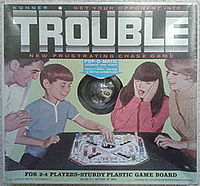
- Tabletop games
- Board games
- Tile-based games
- Turn-based games.html
- Abstract strategy games
- card games
- Connection games
- Mancala games
- Paper-and-pencil games
- Word games



 |
|
| Players | 2-4 |
|---|---|
| Age range | family |
| Playing time | ~30 minutes |
| Random chance | High (dice) |
Trouble is a board game in which players compete to be the first to send four pieces all the way around a board. Pieces are moved according to the roll of a die. Trouble was developed by the Kohner Brothers and initially manufactured by Irwin Toy Ltd., later by Milton Bradley (now part of Hasbro). The game was launched in the United States in 1965. It is very similar to the much older game, Mensch ärgere dich nicht as well as another Hasbro game, Sorry! (originally marketed by Parker Brothers). The classic version is now marketed by Winning Moves.
Players can send opponents' pieces back to the start by landing on them. Players may not touch the other player's piece, otherwise the piece's owner must redo the pop/roll. Pieces are protected from capture after arriving in the final four slots. Unlike more complex race games, however, counters cannot be maneuvered to block opponents' moves.
The most notable feature of Trouble is the "Pop-O-Matic" die container. This device is a clear plastic hemisphere containing the die, placed over a flexible sheet. Players roll the die by pressing down quickly on the bubble, which flexes the sheet and causes the die to tumble upon its rebound. The Pop-O-Matic container produces a popping sound when it is used, and prevents the die from being lost (and players from cheating by improper rolling). It allows for quick die rolls, and players' turns can be performed in rapid succession. The die is imprinted with Arabic numerals rather than the traditional circular pips (though the circular pips are used in the Travel version, which contains a cover to keep the pegs from being lost).
Players may move pieces out of their start only when the die lands on 6. Getting a 6 at any point in the board game also allows the player to take another turn, even if the player cannot move any of their pieces (as they cannot land on any of their own pieces). They can also move a new piece out even if they have another piece currently in play, and can also do the same if another player's piece is occupying their "start" space (thus sending that player's piece back), but cannot do so when one of their own pieces is occupying their "start" space.
If the die in the "Pop-O-Matic" container has not clearly landed on a number, then the player who popped it can tap the "Pop-O-Matic", but may not re-pop while the die is in limbo.
Similar games entitled Headache and Frustration were also produced by the Milton Bradley Company. The game is called Frustration! in the UK where a world championship is held biannually in the Isle of Wight over two days, the morphing of a number of smaller regional leagues and tournaments played over the last two decades. In the World Championship the first year's championship is decided on 31 December and the second on 1 January. Substantial cash prizes are awarded to the winner with 2012 world champion being Elizabeth O'Brien from Woolton near Liverpool. O'Brien also retained her world crown on 31 December 2013, giving her three consecutive victories and a substantial cash prize. The current 2014 world champion is football coach and artisan Andrew Rimmer. Celebrity players of the cult game include renowned travel author Tim Moore and actor-presenter Simon O'Brien, husband of Elizabeth. Moore is the current holder of the Elite Premier World League (EPWL) first played in southern France in summer 2013, which also presented a significant cash prize for the winner. The second EPWL - an invitation tournament - is slated to be played in the Spanish region of Valencia in June 2014. Participants are coming from France, Germany and the UK to participate. The game in the UK has developed internal jargon such as "co" for "cocked dice"; this describes when the dice inside the "Pop-O-Matic" fail to land completely flat, prompting a re-roll.